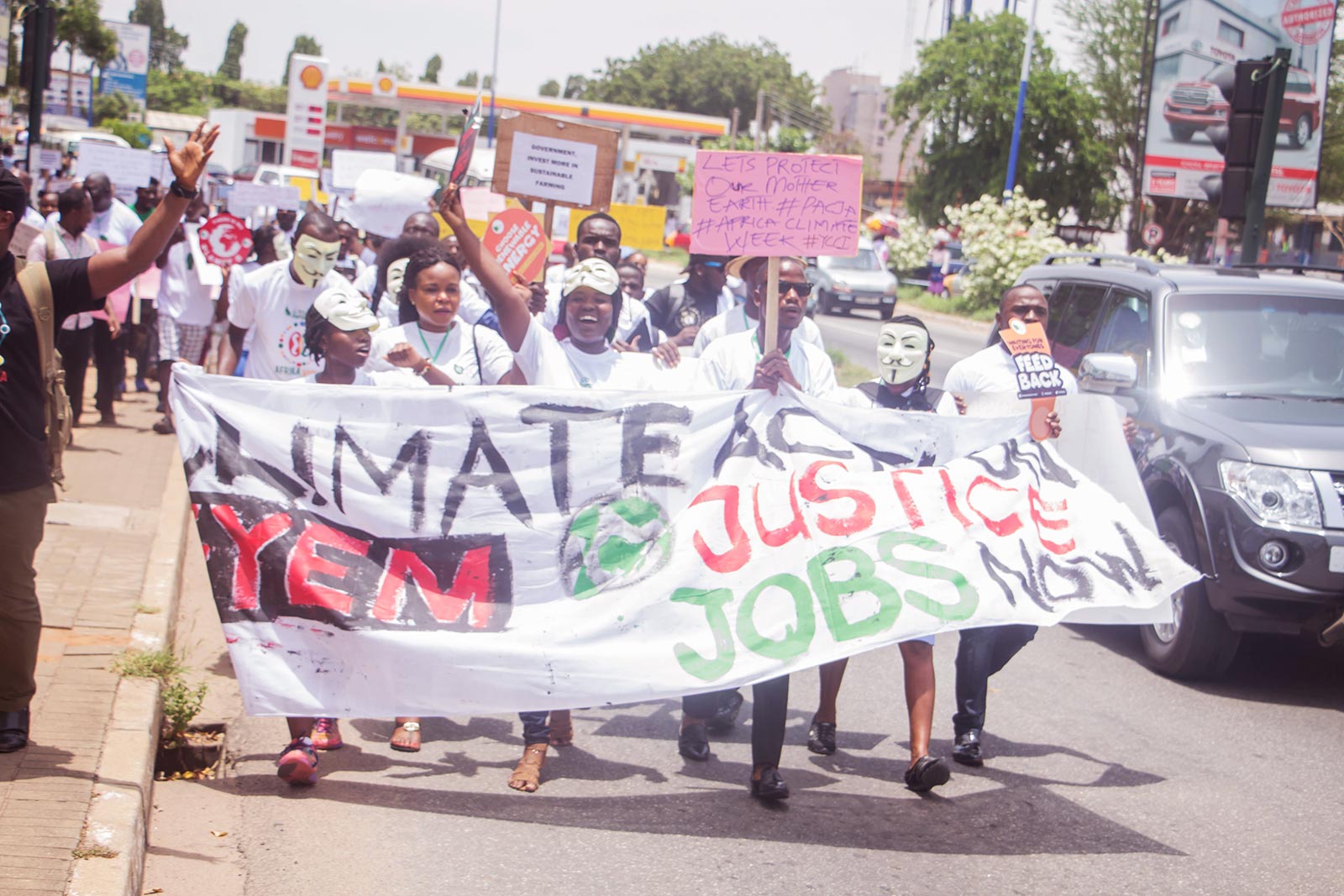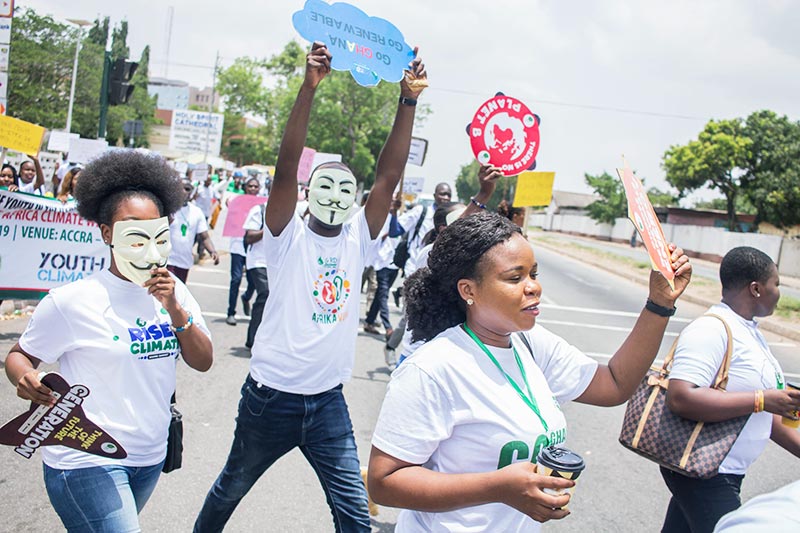#AfrikaVuka Uprising: 48hours of incredible hope and determination
#AfrikaVuka, a call for climate justice and the end of fossil fuel use in Africa. Last week, we saw continent-wide events and protests demanding action on the climate crisis. While several events were cancelled due to their ‘political’ nature in Uganda, Kenya and Senegal, these obstructions by authorities in both countries paled in comparison to how communities from Nairobi, to Cairo, Kinshasa to Cape Town showed leaders the way to fight climate change:
The resounding message of climate change and the sound of awakening to address it were heard in Kano, Nigeria. @350Africa @surgeafricaorg #afrikavuka #AfricaDay2019 pic.twitter.com/EXZv4NKGvz
— 350nigeria.org (@350nigeriaO) May 26, 2019
La marche de protestation contre l'exploitation du pétrole dans #Parc #virunga & des soutiens à l'utilisation des #énergies #renouvelables à Kinshasa #AfrikaVuka avec à la participation des organisations des jeunes et celle des jeunes #RDC #Afrikavuka@350Africa @ZER0_missions pic.twitter.com/kE4gj66WBH
— HOPELANDCONGO (@Hlcasbl) May 25, 2019
These #AfrikaVuka actions coincided with Africa Day and Global Youth Strikes for Climate, where school students demanded action to prevent further global heating and climate change. Communities across the continent are fighting for the future, as record storms, droughts and flooding devastated entire regions. Africans can no longer ignore the fact that they have contributed the least to the climate crisis but are already experiencing its worst impacts. We need a sustainable path for our future and the solution is simple, We must stop using fossil fuels.
#AfrikaVuka is a campaigning platform aimed at uniting and supporting citizens, communities, organisations and coalitions working to build a future which is free from the destructive impacts of the climate crisis across Africa. You can be a part of the movement here.
“Stop Procrastinating and lip-service, Take Immediate Action” Activists in Ghana tell African Leaders
On the 21st of March, 350 Ghana Reducing Our Carbon took to the streets together with Ghana Youth Environmental Movement, Green Africa Youth Movement and other climate justice organisations like PACJA, Peasant Farmers Association of Ghana, Friends of the Earth Nigeria to demand real climate action.

The action was amongst a series of activities by the 350 GROC team in response to the proceedings of the Africa Climate Week hosted by the government of Ghana from 18 - 22 March. The summit’s aim was to enhance engagement between State and non‐State actors in the key sectors of energy, agriculture and human settlements.

The activists in Accra clearly expressed their opposition to fossil fuels and carbon markets, saying that such false solutions have no place in the new dawn of Ghana, and Africa if we have to combat climate change and achieve the goals of sustainable development.
Before that action, a press conference was held where 350 GROC and its partners asked their government to stop the lip-service and accelerate the energy transition towards 100% renewables.
Although there were no solid commitments from the Africa Climate Week, 350 GROC committed to continuing to push the Ghanaian government to be ambitious and not delay the transition for a 100% renewable energy future.
- Rukiya Khamis
Press Release: #MANDELA 100
17 July 2018
Contact: Lerato Ngakane, 350Africa.org Communications Coordinator, +27 81 464 9726, Lerato.Ngakane@350.org
As Mandela turns 100, South Africans call on Ramaphosa to ditch coal and approve modern energy policy to fulfil his legacy
JOHANNESBURG - Today, as former US President Barack Obama delivers the Nelson Mandela Annual Lecture, citizens will gather in front of the Bidvest Wanderers Stadium in Illovo, Johannesburg, to ask President Ramaphosa to improve his climate record by overseeing the immediate release of an updated electricity plan that excludes coal or nuclear power.
Since he took office, President Ramaphosa has created expectations of progressive policy shifts in numerous sectors. However, South Africa’s energy policy is outdated and still heavily reliant on coal as a source of electricity generation, which makes it dramatically out of step with the country’s own commitments to address climate change.
South Africa’s long-awaited update to the 2010 Integrated Resource Plan (IRP) is expected to be submitted to parliament in August setting out the path for the country’s future energy mix. This highly anticipated master plan will be critical to ensuring that South Africa embraces a just energy transition where citizens benefit from new, clean energy technologies that reduce electricity costs, while tackling energy poverty, creating new jobs for those employed in the dying coal industry and the unemployed, and meeting the Paris Agreement target of keeping the world from warming over 2°C, aiming for 1.5°C.
Glen Tyler, South Africa team leader at 350.org said, “South Africa deserves a modern energy policy fit for the future and rooted in justice and access for all. The only way to accomplish that is to stop all coal development projects and set the course for a robust transition to a low-carbon economy powered by 100% renewable energy. While he listens to Obama’s lecture on ‘renewing Mandela’s legacy and promoting active citizenship in a changing world’, President Ramaphosa should ask himself what he wants his own climate legacy to be.”
This September, in the spirit of Nelson Mandela, and in line with president Ramaphosa’s Thuma Mina campaign which calls for active citizenship to alleviate South Africa’s challenges, South Africans will #RiseforClimate, organising and pushing for the government in power to recommit to the Paris Agreement by approving a new IRP that promotes renewable energy and progressively ditches coal as a polluting thing of the past.
South Africans will not be alone. People across the world will mobilise on the 8th of September, ahead of the Global Climate Action Summit in California, to demand that local leaders build a fossil free world that works for everyone. Hundreds of events will take place all over the globe to put pressure on leaders for a fast and just transition from fossil fuels to renewable energy. The full range of events can be seen at www.riseforclimate.org.
NOTES FOR THE EDITOR
On 12-14 September 2018 the Governor of California, Jerry Brown will host The Global Climate Action Summit in California, Los Angeles. Its goal is to demonstrate how the tide has turned in the race against climate change, showcase climate action taking place around the world, and inspire deeper commitments from each other and from national governments. It will be the largest gathering of its kind, where leaders from around the world from across sectors will come together to make bold commitments - from mayors & local governments to business and civil society. The global mobilisation will ultimately strengthen the message to national governments that the energy transition is necessary and achievable and that they should follow suit later this year at COP24 by committing to revise their national climate plans by 2020.
#RiseforClimate
Break Free 2018: These events caught our imagination.
-
In Kenya - Folks will be rolling out coordinated actions - Photo exhibitions, debates, twitter chats, and an “AntiCoal Khanga show“ in Lamu challenging women to use a traditional attire (Khanga: a vibrantly coloured East African cloth worn by women) to tell the African story of fossil fuel impacts.
-
In Nigeria - People will be joining forces to talk about the easy switch from generators and kerosene for lighting to solar in a caravan around a college. A press conference with people from mining-affected communities, a renewable energy presentation and non-violent direct action training will also be held.
-
In Ivory coast - Film screenings and community debate to denounce a coal plant project in San-Pedro, alongside a Twitter chat addressed to the AfDB - who are funding coal projects across Africa to reiterate that Ivory Coast doesn’t need coal, but rather renewables to satisfy its energy demand and accelerate its development.
-
In South Africa, events range from rallies to workshops on climate change and the case for breaking free from fossil fuels, to people calling on the Development Bank of Southern Africa to publicly commit to not funding the Thabametsi coal-fired power plant.
-
In Senegal - Civil society and climate justice groups, local communities, students and women groups are attending a large community forum in Bargny to oppose the launch of the first coal power plant in Senegal and call on the government to stop this project.
-
In Ghana - 350 GROC is reaching out to communities in the Eastern region of Ghana (Dome, Asayansu, Kwesi Kunde, Fori) to mobilise on renewable energy This event is part of the ongoing campaign led by GROC to advocate for a rapid transition towards 100% renewables as a way of increasing electricity access to communities.
#ThumaMina – call on the DBSA to publicly commit to not financing new coal
We all know we don't need another coal plant. Besides the immediate impact on the health of people living close to the plant, emissions from coal-fired power plants contribute to climate change. Burning more coal will only lead to more catastrophic climate change, more extreme weather and even more impacts like the drought in the Cape and dangerous storms. Coal is killing us and our planet and it's time we took action to stop it.
South Africa is at the shore of a national water crisis. Corruption within the coal sector threatens the country’s democracy and has been entrenched into the highest levels of governance. Reports on how load shedding was used as a money-making scheme, irregularities within the Water and Sanitation Department and ensuing economic misfortune has reached extreme levels and has South Africans feeling despondent in the midst of a water crisis. In order to avoid the situation becoming any worse, public and private financial institutions need to be persuaded to break ties with the coal sector, which threatens our collective well being.
This is why 350Africa has launched the Thuma Mina(lend a hand) DBSA campaign calling on the DBSA to permanently withdraw from financing Thabametsi. The plant will use outdated technology and as a result will be a coal plant with disproportionate emissions, impacts on human health, water availability, and agricultural productivity in an age when any new coal plant cannot compete economically with renewable energy and is a climate crime. Set to begin operating in 2021 with a lifespan of 45 years, the plant would mean that either South Africa will not be able to meet its climate change obligations, or that the power plant will close early, becoming a stranded asset.
The Life After Coal campaign has made incredible progress towards stopping Thabametsi. We now call on the DBSA to continue their work supporting renewable energy and commit to not funding this new coal power plant. Their slogan is #MakeChangeHappen, let’s do it sustainably.
You can join the call by visiting the campaign website and signing the petition asking the DBSA to commit to not funding coal.



